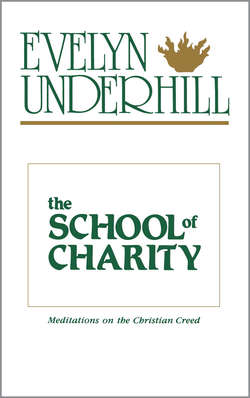Читать книгу The School of Charity - Evelyn Underhill - Страница 8
На сайте Литреса книга снята с продажи.
FOREWORD
ОглавлениеIt was a great thing for London that we were able to induce one of the best-known writers on the Spiritual Life, to undertake our Lenten book for this year. I have read it carefully through twice, and I shall be surprised if it is not considered one of the deepest and most helpful books of the kind she has written.
The first advice which I should give to the reader of it is that it shall be read through very carefully, first once and then twice, otherwise the deep thought and spiritual experience which underlies it might be missed.
The truths that have gone home most to me (others may find messages in it which more appeal to them) are:
(1) How few and great are the solid facts which underlie all religion. We discuss and dispute over so many things which lie on the surface, but “I believe in God” carries us right down into the heart of Eternal Mystery. “The Christian creed,” says the author, “is a hand-list of the soul’s essential requirements: the iron ration of truths, the knowledge of mighty realities”
(2) The second fact which comes out in this book is how practical mystics are. I suppose that Miss Evelyn Underhill is best known as a writer on Mysticism, and yet you could not find a more practical book than this is.
“What theology means by the Incarnation is the eternal Charity of God finding utterance within His creation.”
“A Light we can bear to look at, and looking at must adore, comes to us from a Light we cannot bear to look at even whilst we worship it.”
“Christ was trained in a carpenter’s shop; and we persist in preferring a confectioner’s shop. But the energy of rescue, the outpouring of sacrificial love, which the supernatural life demands, is not to be got from a diet of devotional meringues and éclairs.”
“The spiritual life does not begin in an arrogant attempt at some peculiar kind of other-worldliness, a rejection of ordinary experience. It begins in the humble recognition that human things can be very holy, full of God.”
All these are great sayings and are eminently practical.
(3) That last quotation leads up to another fact very encouraging to us ordinary people, and that is the capability of all of us to live the spiritual life.
“After all, the shepherds got there long before the Magi; and even so, the animals were already in position when the shepherds arrived.”
“The essence of the story of the Magi is that it is no use to be too clever about life. Only in so far as we find God in it, do we find any meaning in it.”
And more than that.
“The child who began by receiving those unexpected pilgrims had a woman of the streets for His most faithful friend, and two thieves for His comrades at the last.”
“The third-rate little town in the hills, with its limited social contacts and monotonous manual work, reproves us when we begin to fuss about our opportunities and our scope.”
(4) But passing over for lack of space the fine chapters on the Cross and the Church—what will stay by me in this book is the description of the Star-life possible to us here and which will continue in the after life.
“We have been shown the sky of stars, enchanting and overwhelming us: and now we realize that we are living the star-life too.”
“We recognize God’s ceaseless pressure on and in our spirits, His generous and secret self-giving on which we depend so entirely.”
And this life, which is Eternal Life, cannot, it is clear, be ended by Death.
“I expect the life of the age that is drawing near,” and therefore we end in our Creed on a “note of inexhaustible possibility and hope.”
“God is the Lord, through whom we escape death.”
“It is true that we cannot conceive all that it means and all that it costs to stand in that world of purity and wonder from which the saints speak to us . . . but because we believe in One God, the Eternal Perfect . . . so we believe in that world prepared for all who love Him; where He shall be All, in all.”
May this noble book stimulate us all to a nobler life!
A. F. LONDON.
